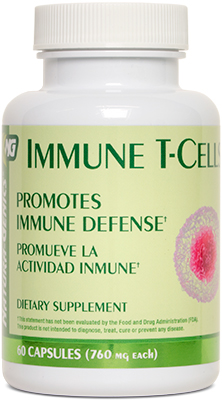Immune T-Cells™
60 Capsules • 760 mg
The immune system protects people from disease caused by bacteria, viruses, and toxins. It helps remove foreign bodies and malignant cells from our system. Also, the immune system is responsible for down-regulating immune responses against external harmless triggers such as food or against the body’s own tissue. Failure to do so can result in the development of allergies or other autoimmune disorders. The immune system is not fully developed at birth, but matures over the first few years of life.60 Capsules • 760 mg
This product is a combination of important antioxidants, minerals, and bovine thymus extract. Intake of thymus extract may promote a broad-spectrum immune response due to improved thymus gland activity.
Raw thymus extract is derived from the thymus glands of young calves.
The thymus is considered one of the major immune system glands. To a certain point, the health of the thymus gland is responsible for many immunological functions, including T lymphocytes production, a type of white blood cell responsible for cell-mediated immunity (immune mechanism not controlled or mediated by antibodies). Cell-mediated immunity has very important protective action against pathogens. In addition, the thymus gland releases several hormones such as thymosin, thymopoietin, and serum thymic factor that regulate immune functions.
Clinical research shows that vitamin C (ascorbic acid) is an important antioxidant. It fights free radicals in the organism which may help reduce or delay a number of illnesses including heart disease. There is also evidence that high doses of vitamin C may decrease the length of cold symptoms and possibly reduce the probability of getting one. In addition, vitamin C promotes healthy aging. The intake of vitamin C has many more functions making this vitamin one of the most important for daily consumption.
Vitamin E is an important nutrient for proper immune function. Research indicates that animals that were fed with diets lacking vitamin E, showed weak immune responses. Supplementation of diets with adequate levels of vitamin E enhanced immune responses. High levels of polyunsaturated fatty acids are immunosuppressive, and vitamin E can partially defeat this immunosuppression. Also, high levels of vitamin C can protect tissue levels of vitamin E and may enhance vitamin E immune activity. Vitamin E can protect some aspects of immune responses from the adverse effects of selenium deficiency. The published information clearly suggests that antioxidants have important effects on immune function.
Deficiency of vitamin A has been associated with increased risk of disease. Vitamin A is critical for the development and functioning of T and B lymphocytes. Thus, low levels of vitamin A results in a reduction of cell-mediated immune responses and decreased specific antibody responses. Vitamin A is known to promote anti-inflammatory activity because of its critical role enhancing immune function.
By now, it is well known that vitamin D3 has important functions to its common effects on calcium and bone stability. Since the vitamin D receptor is present on immune cells (B-cells, T-cells, and antigen presenting cells) and these immunologic cells are capable of synthesizing the active vitamin D metabolite, vitamin D has the capability for immunological activity. Deficiency of vitamin D is also being associated with increased autoimmunity as well as an increased susceptibility to disease.
Selenium is an essential micronutrient and important for human health, including optimal function of thyroid hormone metabolism, cardiovascular and neurological health, and proper immune responses.
An essential element, zinc, influences growth and affects the development and integrity of the immune system. Research has begun to clarify the mechanisms explaining the activity of zinc on immune function. It is well known that zinc has a broad impact on key immunity mediators such as enzymes, thymic peptides and cytokines, explaining the importance of this element on the regulation of immune activity.
Citrus bioflavonoids are powerful antioxidants that can help support the immune system. They possess vitamin-like properties and also referred as to vitamin P. Citrus flavonoids are needed for vitamin C to be used effectively by the organism.
For over 1500 years, both Chinese and Indian cultures have used cloves and clove oil extract in herbal medicine. Cloves are full of minerals and vitamins. The main ingredient of cloves that contributes with immune activity is eugenol, which gives cloves their unique odor. Studies have found that eugenol stopped oxidative damage caused by free radicals showing potent antioxidant properties.
| Supplement Facts | |||
| Serving Size: 2 Capsules | |||
| Servings per Container: 30 | |||
| Amount per 2 Capsules | %DV* | ||
| Vitamin C (as ascorbic acid) | 300 mg | 333 | |
| Vitamin A (as Retinyl Palmitate) | 10,000 IU | 5.50 mg | 200 |
| Vitamin E (d-alpha Tocopheryl Succinate) | 200 IU | 172 mg | 600 |
| Vitamin D3 (as Cholecalciferol) | 2,000 IU | 50 mcg | 250% |
| Citrus Bioflavonoids Extract (25%) | 22 mg | * | |
| Zinc (as Bisglycinate Chelate, | |||
| yielding 40 mg of elemental Zn) | 200 mg | 364 | |
| Selenium (as Selenium Complex) | 200 mcg | 364 | |
| Proprietary blend | 820 mg | ||
| Bovine Thymus Extract | * | ||
| Organic Clove (Syzygium aromaticum) | * | ||
| *Daily Value not established | |||
Other Ingredients: Gelatin.
Recommendations: As a dietary supplement, take two (2) capsules daily.
Caution: Do not use this product if pregnant or nursing. Do not use
this supplement if the band around the cap is broken or missing.
If symptoms persist, consult a doctor. Keep this product out of reach
of children.
Storage: Keep tightly closed in a dry place and do not expose
to excessive heat.
The statements above have not been evaluated by the Food and Drug Administration (FDA).
This product is not intended to diagnose, treat, cure or prevent any disease.





